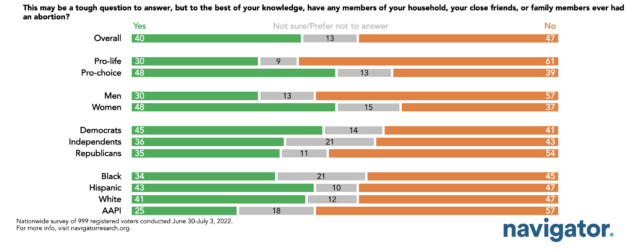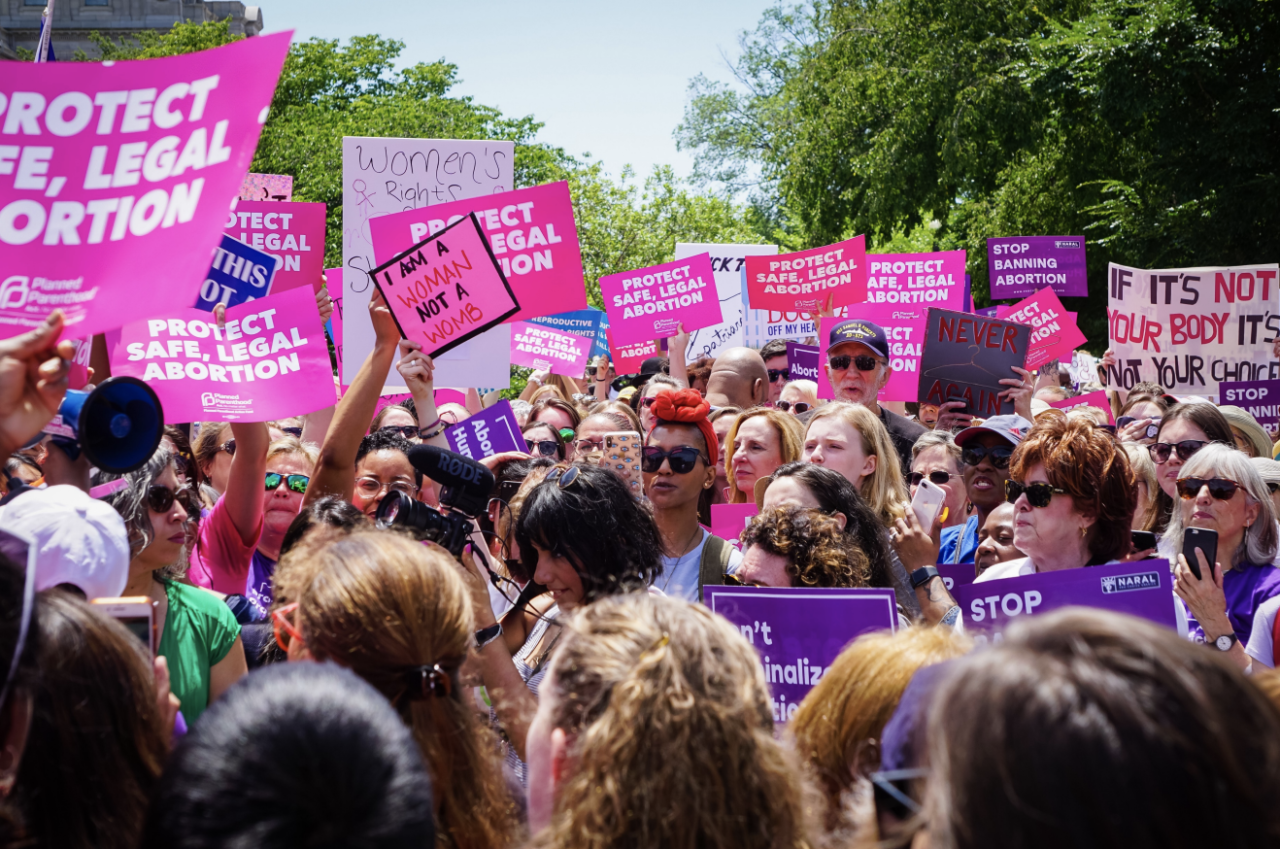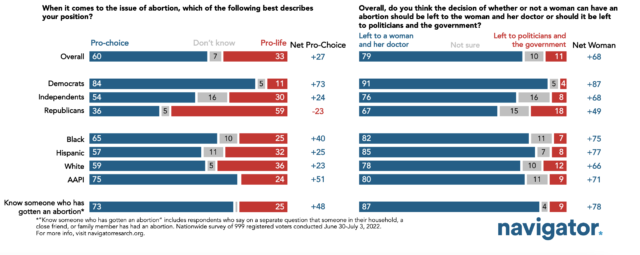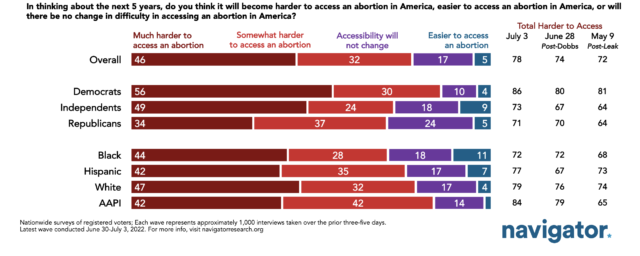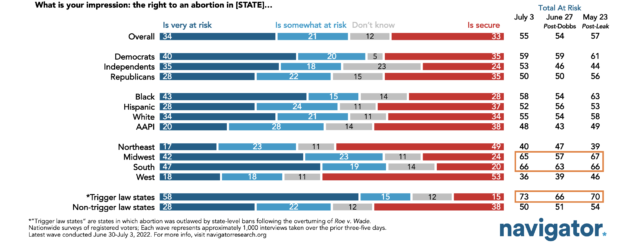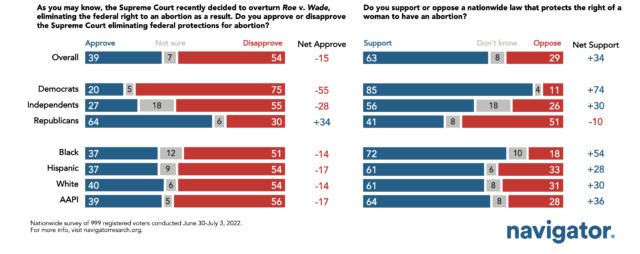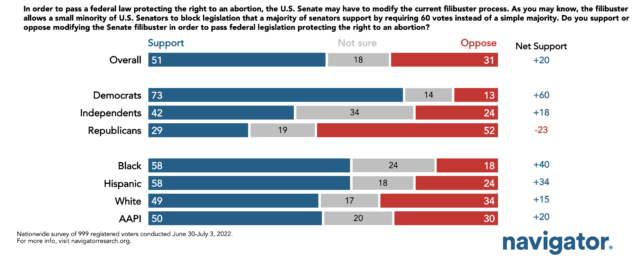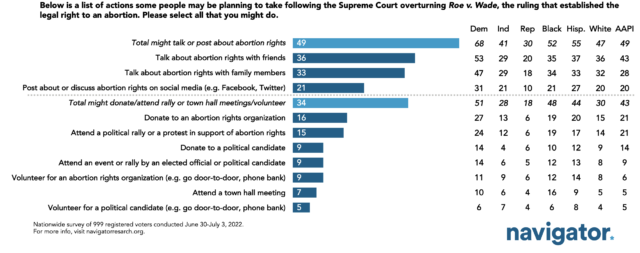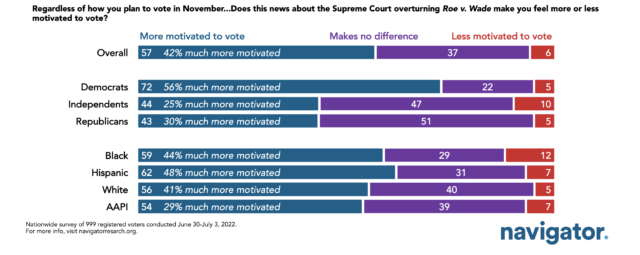- Three in five Americans are “pro-choice” and an even larger share feel the decision to get an abortion should be between a woman and her doctor.
- Democrats in particular show high levels of planned civic engagement and are more motivated to vote in 2022 following Roe being overturned.
- The popularity of the Supreme Court continues to decline in the wake of its decision to overturn Roe, and views of the Republican Party are also in decline.
- Messaging that meets the moment focuses on lack of exceptions for rape and incest, turning back the clock on progress and stripping women of their rights, and the ruling harming the most vulnerable women in America.
Americans Remain “Pro-Choice” and Feel the Decision Overwhelmingly Should Be Left to Women and Their Doctors
Majorities of Democrats, independents, and Americans across race and ethnicity identify as “pro-choice,” as do nearly three in four Americans who report knowing someone who has had an abortion (73%).
Nearly Eight in Ten Say It Will Be Harder to Access an Abortion in the United States in the Future
More than seven in ten independents believe it will be harder to access an abortion in the future (73%) – a 9-point increase since early May (from 64%).
Majorities Say Abortion Rights at Risk in Their State; Midwest, South, and States with Trigger Laws Feel It Most Acutely
In states with trigger laws*, there has been a 7-point increase in the share who say the right to an abortion is at risk since late June (from 66% to 73%)
Majorities Disapprove of Court Overturning Roe, But Even Greater Share Supports Codifying Abortion Rights into Law
Republicans are the lone approvers of the Supreme Court’s decision to overturn Roe v. Wade (64% approve). Every other partisan, racial, and ethnic group disapproves by double-digit margins, including independents (55% disapprove).
More Than Half of Americans Support Modifying the Filibuster to Pass Federal Legislation Protecting Abortion Rights
Nearly three in four Democrats (73%) and a plurality of independents (42%) support modifying the filibuster to pass federal legislation to protect the right to an abortion.
Almost Half of Americans Plan to Talk or Post About Abortion Rights, Another Third Will Donate/Attend Events/Volunteer
Nearly seven in ten Democrats (68%), and 41% of independents, plan to talk or post about abortion rights; a majority of Democrats (51%) say they will also donate to organizations or candidates, attend events, or volunteer for candidates and organizations.
Three in Four Democrats Are More Motivated to Vote Following SCOTUS’s Decision on Roe
More than half of Democrats (56%) say the ruling makes them “much more motivated to vote,” compared to just 30% of Republicans who say the same.
Views of the Supreme Court Continue to Decline in the Aftermath of Overturning Roe
Net favorability for the Supreme Court has fallen by 17 points since last asked in early May and by 29 points since February.
- Since February, there has been a 28-point decline in net favorability among independents (from net +4 to net -24).
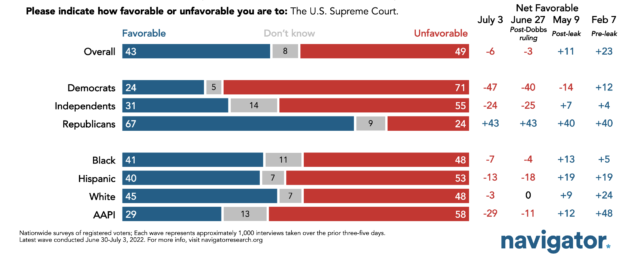
Pluralities Say the Supreme Court Is “Too Conservative”
Two in three Democrats (65%) and nearly half of independents (43%) say the Supreme Court is too conservative following its decision to overturn Roe v. Wade – even 19% of Republicans say the same.
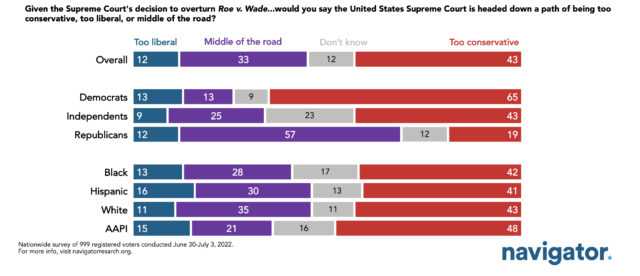
As SCOTUS Continues to Decline in Public Trust, Support Grows for Court Expansion
Since mid-April, the share who say they “trust the Supreme Court to make the right decisions in the future” has declined by a net of 62 points among Democrats (from net +26 to net -36) and 40 points among independents (from net +12 to net -28).
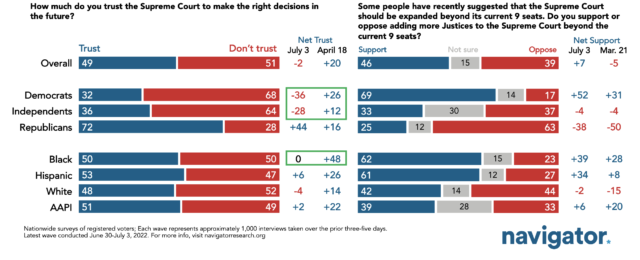
The Republican Party’s Favorability Has Declined By Double Digits Since Roe Was Overturned
Since late May, the share who view the Republican Party favorably has declined by a net of 10 points overall (from net -7 to net -17) and 24 points among independents (from net -19 to net -43), while views of the Democratic Party have remained more consistent.
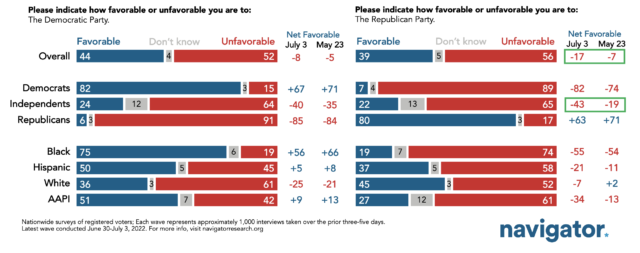
Republicans Who Stand on the Side of Abortion Bans or Opposing the Right See Potential Consequences on the Vote
Against a Republican who wants to ban abortion nationally, a Democrat who supports abortion access has an 18-point advantage on a Congressional ballot (54% Democrat to 36% Republican). Among independents, the Democrat has a 36-point lead (48% Democrat to 12% Republican, 40% undecided).
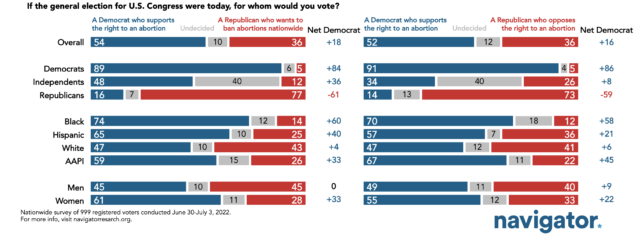
Majorities Support Federal Action on Abortion Including Codification, Protecting Mailing of and Access to Abortion Pills
At least seven in ten Democrats support each potential policy step Biden and the federal government could take.
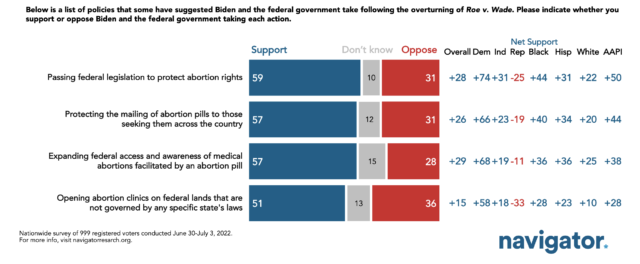
Bipartisan Majorities Find a Range of Potential Consequences of Roe Being Overturned Concerning
Two in three independents find each concerning (at least 66%), with up to 77% finding women seeking unsafe abortions concerning.
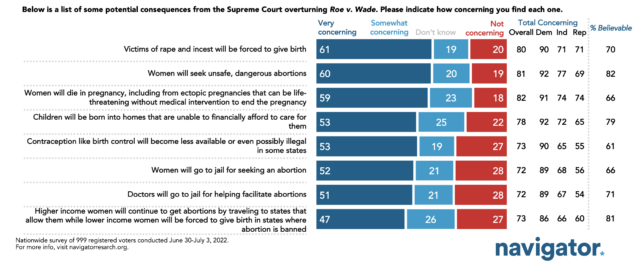
Most Concerning & Believable Roe Consequences Are Women Seeking Unsafe Abortions and Lack of Exceptions
On a list of potential consequences from Roe being overturned, half of respondents were asked to rate each on a scale of “concerning” and the other, “believability.” Consequences that were most concerning and believable include women seeking dangerous abortions and victims of rape and incest being forced to give birth.
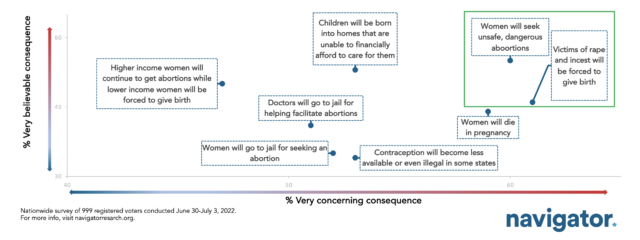
Lack of Exceptions, Stripping Women of Their Rights, and Harming the Vulnerable Are Most Concerning on Roe
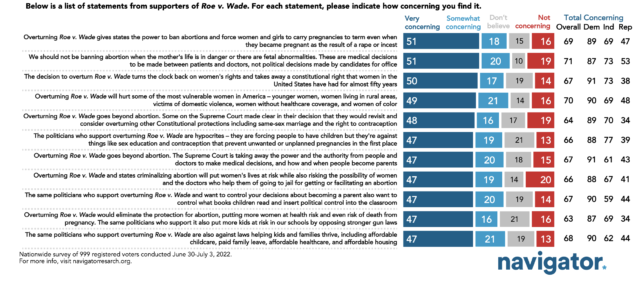
Most Concerning Statements About GOP Focus on Lack of Exceptions, Erasing Progress, and Harming the Vulnerable
Three in five find each of a range of criticisms of Republicans for their stances on abortion concerning.
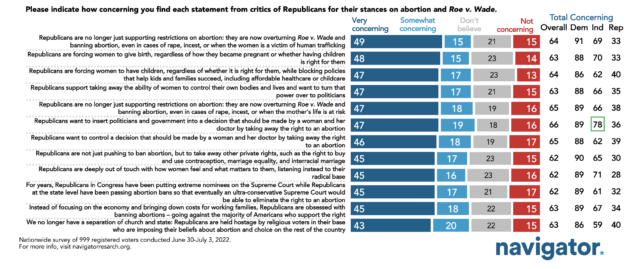
“Women’s Rights” Dominate Concerns About SCOTUS and Republicans Overturning Abortion Rights
Many Americans bring up concerns about the Supreme Court and Republicans stripping women’s rights, dictating women’s rights, and doing so in the name of religion. Others mention the danger the decision poses to women who may seek alternatives to safe abortion and the Supreme Court pushing religious ideas or overstepping their duty.
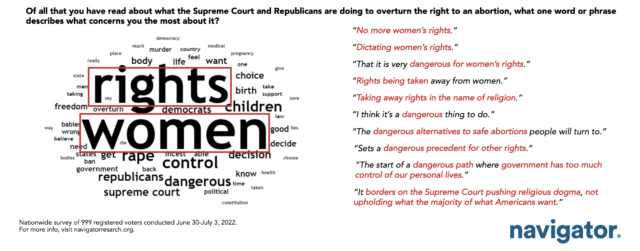
Two in Five Americans Report Knowing Someone Close to Them Who Has Had an Abortion
While the gender gap in knowing someone who has had an abortion is 18 points (30% of men compared to 48% of women), the partisan gap is just 10 points (45% of Democrats know someone compared to 35% of Republicans).
- Pro-choice Americans (48%) are 18-points more likely to know someone who has had an abortion than pro-life Americans (30%).
